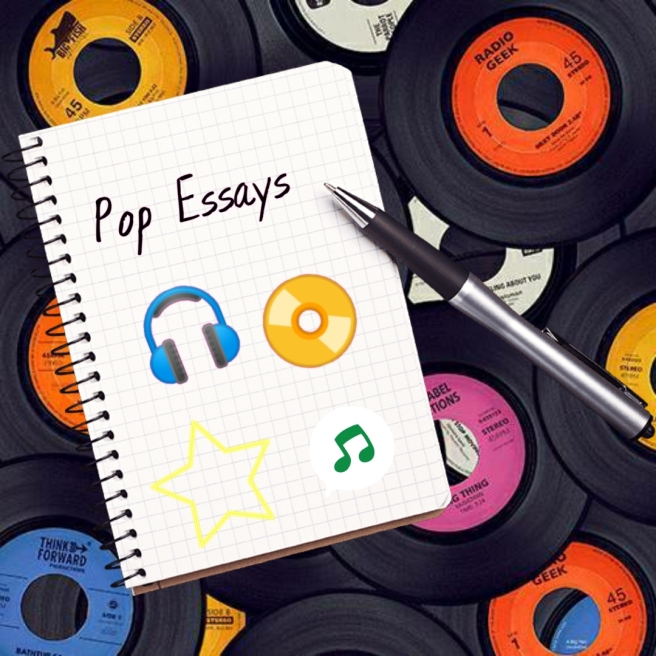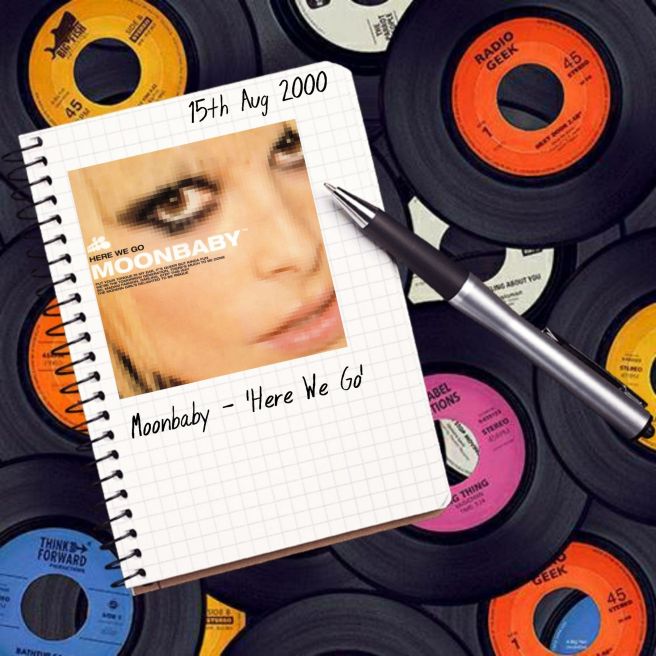Welcome back to yet another uncovering of a musical nugget that time has forgotten, in this week’s Pop Essays. This week; the genesis of what became one of the most defining pop production outfits of the Noughties – and the extraordinary route they took there…
- Artist: Moonbaby
- Song: Here We Go
- Released: 15/08/2000 (Cancelled)
- Writers / Producers: Miranda Cooper / Brian Higgins / Matt Gray / Xenomania
- Highest UK Chart Position: Did Not Chart
- Chart Run: Did Not Chart
The publication last year of the book “Reach For The Stars” by Michael Cragg, profiling the boom years of UK pop music from around 1996 to 2005, made for fascinating reading, in so far as for the first time ever, through a series of interwoven narratives from the people who lived through it – artists, record companies, managers, songwriters, producers, fans – it painted a rich and vivid depiction of the top of the charts as it was in those hazy glory days of Top of the Pops, Smash Hits, CD:UK and Woolworths – all things we hold dear to our heart.
But it also shed light on how some of the key players of that era came into being. Of course, one of the most interesting chapters for us to read, were the ones covering how one of the 00s leading pop production teams, Xenomania, came into being. Because their origins are that unlikely a ground for producing some of the most forward thinking pop music of the new millennium, and yet made for such a winning combination.
The connector that ultimately bought Brian Higgins and Miranda Cooper together was Motiv8, the alias of songwriter and producer Steve Rodway; Brian was a session keyboardist for them at the time (he can be seen in the video for their 1995 top 40 hit “Searching For The Golden Eye” featuring powerhouse house music singer, Kym Mazelle).
Miranda, meanwhile, was a backing dancer, and having been spotted by Dannii Minogue at Pineapple Dance Studios in Covent Garden, was in the video for her 1994 top 40 hit “Get Into You”, before working as a dancer with Ant & Dec, and then winding up dancing for Gina G at the Eurovision Song Contest in 1996 on her iconic banger “Ooh, Aah… Just A Little Bit” – which was produced by? Very good.
Steve Allen at Eternal, the dance pop subdivision of Warner Records that was home to both Gina G and Dannii Minogue, spotted both Miranda and Gina’s other Eurovision dancer, Chloe Tréend, who were merged to form the short lived duo T-Shirt, releasing a reworked but slightly mistimed cover of Hot Chocolate’s “You Sexy Thing” (mistimed in so far as the original was about to experience a second wind following its use in The Full Monty).
It was around about this time, Miranda said, that she was first introduced to Brian and Matt Gray, who had left Motiv8 at this point to form the fledgling Xenomania, all whilst still being in a day job. Miranda, meanwhile, was meant to be going on tour in Australia with T-Shirt.
But she kept returning to Brian’s little studio in his garden shed in Kent, after he asked her to write for a backing track, which ended up being a song called “Hey I’m OK”. Her sonic points of reference were musicals, “but then my brother was into punk and indie. He’d give me lots of The Cure, The Sex Pistols and Blondie, and I was massively into Transvision Vamp“. She never did go on tour in Australia, and thank God she didn’t.
Another song she wrote, with the fantastically OTT line “I’ve got a hot pink scooter with a cherry red hooter” was also conceived. This was the beginning of the project that became Moonbaby, which, according to Brian, “was really the sound of Girls Aloud in its newborn state”. In the meantime, Xenomania’s first two big successes – “All I Wanna Do” for Dannii Minogue (#4, August 1997) and the massive worldwide selling #1 hit for Cher, “Believe“, in 1998, came along.
After being signed to management by Oliver Smallman at 1st Avenue, home to Eternal, Louise and Honeyz, Pete Tong showed a keen interest and signed Moonbaby to London Records. The first (and as it turned out, only) single from the project, “Here We Go”, was one that was to take a long and protracted route and ultimately, a life of its own. But here, in its most primal form, with shades of Debbie Harry and The Cardigans, is the blueprint being set for what followed from Brian and Miranda.
Starting with a kind of cocktail bar lounge double bass and rolling guitar licks (the former courtesy of Herbie Flowers, who had done bass on tracks for the likes of Elton John, David Bowie and Lou Reed), the song immediately sets out its stall and Miranda’s handy way around a quirky lyric: “Put your tongue in my ear, it’s queer, but kinda fun / We’re the tomorrow generation, there’s much to be done / So Madam fashion, darling step this way / The modern girl’s delighted to be risqué”.
In then, comes a clattering of drum’n’bass beats and surf guitar, on the bridge: “Here we go, we’re gonna rock’n’roll till we stop / And then we’ll drop / It’s a squeeze, but if you just say please then that’s fine / It’ll be sublime / The bass line cuts deeper, than the sharpest stiletto / So 1, 2, 3 now baby, here we go (go, go)”.
It builds to an epic payoff, as a screech of rock guitars blitz into the chorus which is as catchy as anything: “Here we go, here we go / I’m your sugar coated doll and you’re my Romeo / Here we go, here we go / Geek or unique, hell get on with the show / Here we go, here we go / I’m your sugar coated doll, you’re my hero / Here we go, here we go, here we go”.
Even the video takes the same multi-layered approach of the song. An incredibly complex affair, which sees Miranda walking backwards through scenes happening in reverse, intercut on the choruses with high energy performance scenes with a slightly edgy sensibility to them, it was certainly breaking from the norm of what pop music was at that time and how it looked and sounded.
Alas, the trouble was, it was just that bit too soon for its time, and, even by Miranda’s own admission on reflection, she knew she wanted to write with Brian, but that she wasn’t necessarily the right vessel to carry the songs in an artist and performance sense.
Although, having said that, that doesn’t excuse what one chauvinistic Radio 1 executive said to Brian upon seeing a press photo of Miranda, bathing in a champagne glass, and refusing to playlist the single with words to the effect of “That dolly bird’s not written this”, a marker if any of the ugly, sexist attitudes that were prevalent in pop at the time.
Which was why the release of “Here We Go” in August 2000 came and went without actually appearing. Cancelled for release, the Moonbaby project never got off the ground, and the London Records deal was axed. But salvation of sorts came before Xenomania’s real breakthrough; whilst the team continued writing and recording in the sprawling Westerham manor formerly lived in by Alice Liddell (inspiration for Lewis Carroll’s Alice In Wonderland) that Brian had bought with the “Believe” royalties, in 2001, a reworked version of the song became the theme tune to the French-Canadian animated cartoon series Totally Spies.
After finally breaking through in 2002 with their work on Sugababes‘ “Round Round“, and Girls Aloud’s “Sound Of The Underground“, the song found yet more life, first as a track on Play With Me, the debut solo album in 2003 from former Aqua lead singer, Lene Nystrøm (who also co-wrote “No Good Advice” with the team for Girls Aloud), before Girls Aloud themselves cut their version for their second album in 2004, What Will The Neighbours Say? It’s quite remarkable for a song that never saw the light of day in its original incarnation.
Indeed, “Here We Go” is the earliest and perhaps best known example of Xenomania’s approach to repurposing everything they wrote and produced; two further Moonbaby songs, “Deadlines & Diets” and “I’m Thru With Love”, went to Girls Aloud and Alesha Dixon respectively in the years that followed. And in the context of their wider career, both together and apart – Miranda’s love of musicals and quirky lyrics and melodies, even at the turn of the millennium, makes her subsequent career writing the music for West End successes such as Fantastically Great Women Who Changed The World make total sense – it illustrates just why Xenomania were so innovative, and continue to be.
Don’t forget to follow our Pop Essays playlist on Spotify, which includes this and all the songs we’ve written about. What are your memories of this week’s featured song or band? Let us know your thoughts in the comments below or message us on our Instagram.


